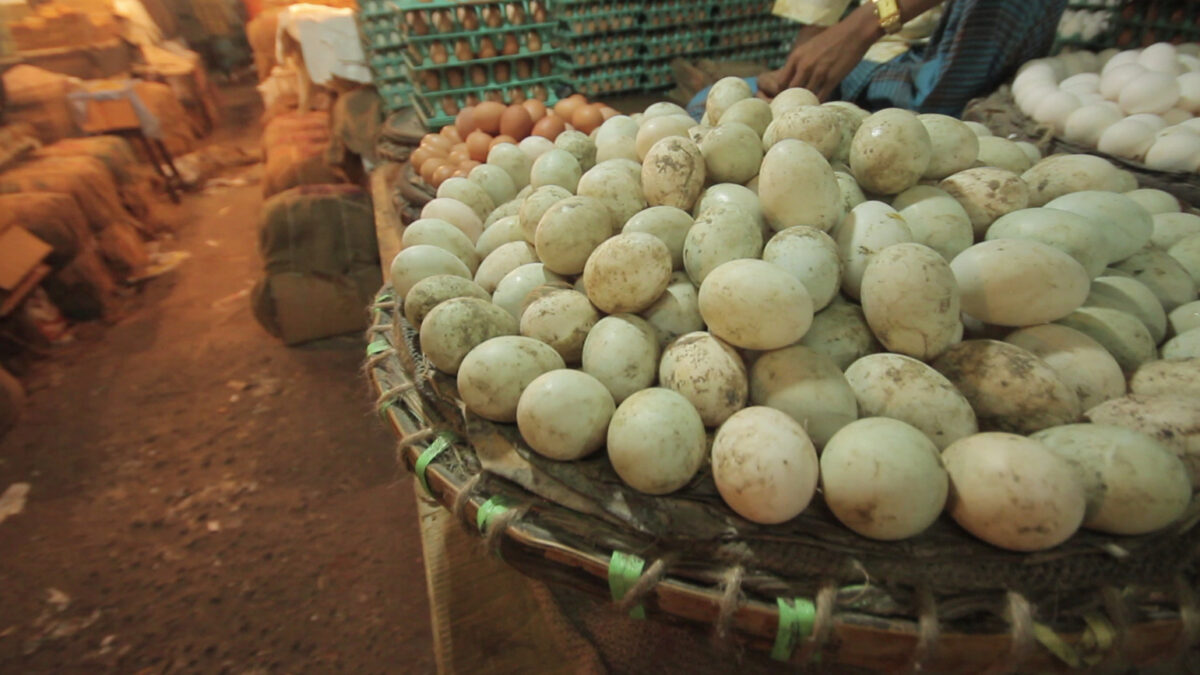Harmful heavy metals have been discovered in eggs inside Bangladesh
Originally published on Global Voices

Eggs are called the poor man's protein. Almost everyone in Bangladesh eats eggs. Photo by Isabelle Hurbain-Palatin via Wikipedia. CC BY-SA 2.0.
However, consuming eggs in Bangladesh is currently not safe. A joint study by six researchers from Jagannath University, Bangladesh Council of Science and Industrial Research (BCSIR), and Haji Mohammad Danesh University of Science and Technology has identified elevated levels of heavy metals in eggs from farms located in Dhaka city, the capital of Bangladesh, surpassing the maximum permissible limits for zinc, copper, lead, and iron. The excess of these heavy metals in eggs poses a health hazard for humans.
The research was published in the October issue (Volume 16, Issue 10) of the Arabian Journal of Chemistry of King Saud University, Saudi Arabia, accessible through ScienceDirect. The study revealed the existence of 10 different heavy metals in eggs, with six of them falling within the maximum permissible levels (MPL). However, the other four: zinc, copper, lead, and iron, exceeded these limits. The significance of these findings is highlighted by the remarks made by Professor Dolan Roy from the Zoology Department of Jagannath University, who was involved in the research. In an interview with the Bangla Daily Prothom Alo, he shared his insights:
খাদ্যে মাত্রাতিরিক্ত যেকোনো ধাতুর উপস্থিতিই খারাপ। এর কারণে হৃদ্যন্ত্র, কিডনি ও যকৃৎ মারাত্মকভাবে ক্ষতিগ্রস্ত হতে পারে। এতে ক্যানসার পর্যন্ত হতে পারে। ফলে ডিমে চারটি ভারী ধাতুর মাত্রাতিরিক্ত উপস্থিতির যে তথ্য আমাদের গবেষণায় উঠে এসেছে, তা অবশ্যই উদ্বেগের কারণ।
… মাত্রাতিরিক্ত দস্তায় রক্তশূন্যতা ও ক্ষুধামান্দ্য হয়। অতিরিক্ত তামার উপস্থিতিতে বমি বমি ভাব, ডায়রিয়া, পেটে অস্বস্তি ইত্যাদি হয়। অতিরিক্ত সিসা কার্ডিওভাসকুলার ব্যবস্থার ক্ষতিসাধন করে, উচ্চ রক্তচাপ বাড়ায়। অতিরিক্ত লোহা কার্ডিয়াক অ্যারেস্ট, শ্বাসপ্রশ্বাসে জটিলতা, খিঁচুনি, বিষণ্নতা ইত্যাদির জন্য দায়ী।
Excessive presence of any metal in our food is detrimental, with the potential for severe harm to the heart, kidneys, and liver, and even the risk of cancer. Our research findings regarding the excessive levels of four heavy metals in eggs, therefore, raise significant concerns.
…. Excessive zinc intake can lead to anaemia and decreased appetite, while an overabundance of copper can result in symptoms like nausea, diarrhoea, and stomach discomfort. Excess lead has the potential to damage the cardiovascular system, contributing to high blood pressure. Also, excessive iron consumption can be linked to cardiac arrest, breathing difficulties, seizures, and depression, among other health issues.
As per data from the Ministry of Commerce, the daily demand for eggs in Bangladesh amounts to approximately forty million. Eggs are a staple in the diet of nearly every individual in the country. Harun Rashid, a commenter on the article mentioned above, expressed concern over the public health hazard associated with heavy metal contamination in eggs:
মুরগির খাবারের মাধ্যমেই বিষাক্ত ধাতু মুরগির পেটে যায়। চামড়ার ট্যানারীর বিষাক্ত বর্জ্য দিয়ে মোরগ এবং মাছের খাবার তৈরি হয়। একটি জাতির মনন যখন পচে যায় তখন এই সব ঘটতেই থাকবে। দেখারও যেন কেউ নেই!
These toxic metals find their way into the chicken's digestive system via their food, which is often prepared in Dhaka using waste materials from leather tanneries. These issues persist when a society's values are compromised, and the consequences go unnoticed by the general populace.

Eggs for sale at a bazar in Dhaka. Image via Flickr by IFPRI. CC BY-NC-ND 2.0.
The presence of heavy metals in poultry eggs
People associated with the poultry sector have attributed the presence of heavy metals in eggs to contamination by tanning industry waste. Tannery wastewater is known to carry substantial concentrations of heavy metals, and in certain instances, it is added into chicken feed due to its protein-rich content, which accelerates chicken growth. Researchers also deduce that these toxic heavy metals make their way into chickens’ bodies via their diet and subsequently find their way into eggs, ultimately posing a risk to human health.
This is why Professor Dolan Roy, a member of the study, emphasized the importance of ensuring the safety of the feed given to farm-raised chickens. Sumon Hawladar, the president of the Bangladesh Poultry Association, an association representing small-scale farmers, has called upon food producers to supply poultry feed that meets safety standards. He stressed that, without such safe poultry feed, small-scale farmers would be unable to produce chicken meat and eggs that are also safe for consumption.
In Bangladesh, contamination is not limited to eggs; it's ubiquitous in various food sources, including chicken, fish, and vegetables. Legal professional Emu Barua wrote in Facebook:
খাবার পানিতে বিষাক্ততা, চালে ক্যাডমিয়াম, ডিমে রাসায়নিক পদার্থের উপস্থিতি, মুরগীতে ক্রমিয়াম, পাউরুটিতে পটাশিয়াম ব্রোমেট, দুধে সীসা, মাছে অতিরিক্ত এন্টিবায়োটিক, চিংড়িতে কেমিক্যাল জেলি, শাকসবজিতে লেদ, আর্সেনিক, কেডিয়ামের উপস্থিতিতে মানুষ কি খেয়ে বাঁচবে!
We encounter contamination in drinking water, cadmium in rice, chemical residues in eggs, chromium in chicken, potassium bromate in bread, lead in milk, an overuse of antibiotics in fish, chemical jelly in shrimp, and the presence of arsenic, cadmium, and lead in vegetables. With such a wide array of contaminants, it becomes increasingly challenging for people to make healthy food choices.
Eggs have traditionally been the cheapest protein source in Bangladesh and were considered an affordable option even for those with the lowest incomes. However, the cost of eggs has been steadily increasing since the onset of the pandemic. Despite government price regulations, the price of eggs in the market has risen. Individuals in the poultry industry have linked this price surge to higher costs of poultry feed and fuel. Thus, the rising prices, combined with contamination concerns, have presented a dual challenge for egg consumption.
Post a Comment